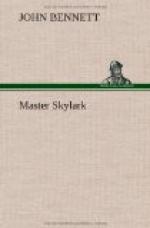Nick heard the bolts shoot heavily, and Master Carew call through the heavy panels: “Now, Jackanapes, sit down and chew the cud of solitude awhile. It may cool thy silly pate for thee, since nothing else will serve. When thou hast found thy common sense, perchance thou’lt find thy freedom, not before.” Then his step went down the corridor, down the stair, through the long hall—a door banged with a hollow sound that echoed through the house, and all was still.
At first, in the utter darkness, Nick could not see at all, and did not move for fear of falling down some awful hole; but as his eyes grew used to the gloom he saw that he was in a little room. The only window was boarded up, but a dim light crept in through narrow cracks and made faint bars across the air. Little motes floated up and down these thin blue bars, wavering in the uncertain light and then lost in the darkness. Upon the floor was a pallet of straw, covered with a coarse sheet, and having a rough coverlet of sheepskin. A round log was the only pillow.
Something moved. Nick, startled, peered into the shadows: it was a strip of ragged tapestry which fluttered on the wall. As he watched it flapping fitfully there came a hollow rattle in the wainscot, and an uncanny sound like the moaning of wind in the chimney.
“Let me out!” he cried, beating upon the door. “Let me out, I say!” A stealthy footstep seemed to go away outside. “Mother, mother!” he cried shrilly, now quite unstrung by fright, and beat frantically upon the door until his hands ached; but no one answered. The window was beyond his reach. Throwing himself upon the hard pallet, he hid his eyes in the coverlet, and cried as if his heart would break.
CHAPTER XVI
MA’M’SELLE CICELY CAREW
How long he lay there in a stupor of despair Nick Attwood never knew. It might have been days or weeks, for all that he took heed; for he was thinking of his mother, and there was no room for more.
The night passed by. Then the day came, by the lines of light that crept across the floor. The door was opened at his back, and a trencher of bread and meat thrust in. He did not touch it, and the rats came out of the wall and pulled the meat about, and gnawed holes in the bread, and squeaked, and ran along the wainscot; but he did not care.
The afternoon dragged slowly by, and the creeping light went up the wall until the roofs across the street shut out the sunset. Sometimes Nick waked and sometimes he slept, he scarce knew which nor cared; nor did he hear the bolts grate cautiously, or see the yellow candle-light steal in across the gloom.
“Boy!” said a soft little voice.
He started up and looked around.
For an instant he thought that he was dreaming, and was glad to think that he would waken by and by from what had been so sad a dream, and find himself safe in his own little bed in Stratford town. For the little maid who stood in the doorway was such a one as his eyes had never looked upon before.




